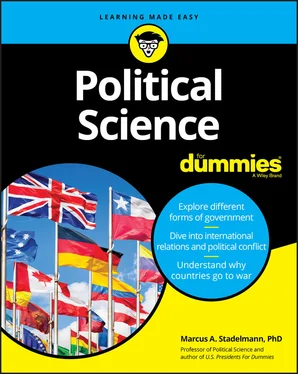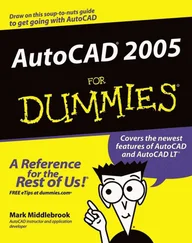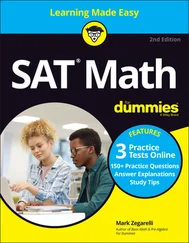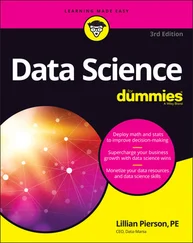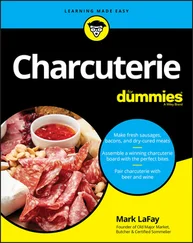Icons Used in This Book Icons Used in This Book As you read and enjoy this book, you’ll see two different icons that alert you to specific aspects related to political science, its subfields, and major writers and their works. This icon points out important information you should be aware of as you read the section, the chapter, or the book. This icon covers only the most important events, people, and issues. Historical information often case-specific, including treaties, important battles, strategic doctrines, and other relevant material or events have this icon beside them. This information isn’t necessary for grasping certain concepts but is required for a political scientist in the making.
Beyond the Book Beyond the Book In addition to what you’re reading right now, this book comes with a free access-anywhere Cheat Sheet that includes a list of political scientists and their major works as well as a handy bank of major political science concepts. To get this Cheat Sheet, simply go to www.dummies.com and type “Political Science For Dummies Cheat Sheet” in the Search box.
Where to Go from Here Where to Go from Here Feel free to start with any chapter in the book that interests you. Keep in mind that all the chapters are nonlinear, so you can start with any topic in any chapter. Happy reading!
3 Part 1: Understanding Political Science Part 1
Chapter 1: Discovering the Discipline of Political Science Chapter 1
Looking at Politics and Political Science Looking at Politics and Political Science Many believe that political science is a way of training for future politicians. Although taking a political science class can be helpful if you want to venture into politics, this isn’t what political science is all about. Political science is a method or a way to study politics. Political science is an academic discipline that studies the relationship between people and political institutions. A discipline is a field of study usually represented by an academic department at a college or university. Political science is a discipline, and so are history, sociology, and biology. Politics impacts people daily, and most of the time they’re not aware of it. Politics determines tax rates, the way businesses are run, the textbooks a child uses in high school, and even how much a person pays for a gallon of milk in the grocery store.
Studying Political Power Studying Political Power Political science is the study of power. The discipline is enamored with the concept of power, namely how A gets B to do what A wants. Therefore, political science studies who holds power and how it’s being used. Political power is the ability to get others to do what you want. It can take force or peaceful means, such as persuasion, to achieve this. Political power is exercised over people in many ways. In the U.S., for example, the federal government exercises political power over its population by forcing its citizens to pay taxes. Who would volunteer to pay taxes once a year unless the federal government had the power to force someone to pay up! Most important, this use of power of the U.S. government is considered rightful by its population. Therefore, the federal government possesses the legitimate use of power over its population. The term government describes the people and institutions that are responsible for making laws and policies in a country.
Searching for Sources of Legitimacy Searching for Sources of Legitimacy A successful government has to have its population recognize its legitimacy. If the population recognizes its government as legitimate, it will follow its leaders’ decisions, and no force needs to be used when implementing policies. For example, if a police officer pulls you over for speeding, you recognize his powers of doing so. In other words, you see his use of power as legitimate and will abide by it. Governments can acquire legitimacy in various ways, as I discuss in the following sections. Legitimacy is the belief that the government’s power over its population is rightful. This results in the exercise of power by a government without having to resort to force. A government that has a high level of legitimacy also has a high level of authority. Its citizens obey laws without having to be forced to.
Chapter 2: Shaping Research in Political Science: Looking at Major Approaches Chapter 2
Starting with Traditionalism Switching to Behavioralism Moving Leftward with Post-Behavioralism Comparing Political Science Theories Looking at Historical Sociology Seeking Benefits: Rational Choice Theory Chapter 3: Dealing with Political Culture Analyzing Political Culture Sustaining Democracy: The Civic Culture Working on Political Socialization Moving from Materialist to Postmaterialist
4 Part 2: Comparing Governments Chapter 4: Discussing Different Forms of Government Identifying Types of Governments Dividing Powers Chapter 5: Setting the Rules: Constitutions Looking at Constitution Basics Creating a New Country: The U.S. Constitution of 1789 Checking on a New Document: The Russian Constitution Chapter 6: Comparing Political Institutions: Systems of Government Comparing Democratic Political Systems Studying the U.S. Congress Looking at Great Britain Analyzing Executives Going Bureaucratic Settling Disputes Chapter 7: Elections, Political Parties, and Interest Groups Studying Elections Political Parties — Necessary for Democracy Interest Groups: Influencing the Government
5 Part 3: Going Global: International Relations Chapter 8: Thinking Globally: The Study of International Relations Understanding the Origins of International Relations Getting into the Theories of International Relations Getting Real: The Power of Realism Doing Good: Idealism Being Equal through Global Humanism Striving for Change with Constructivism Chapter 9: Creating Some Order: International Law and Diplomacy Defining International Law Studying Sources of International Law Connecting with Diplomacy Chapter 10: Creating Order through International Organizations Getting Together in Europe — The Concert of Europe Calling for a League of Nations Needing a United Nations Chapter 11: Not Going to War: The Cold War 1946–1991 Explaining the Cold War Highlighting the Cold War Analyzing Strategic Doctrines and the Arms Race Chapter 12: Dealing with Political Violence: War and Terrorism Examining Warfare Looking at the Causes of War Dealing with Terrorism Going to War with Evil Exploring the Costs of War Chapter 13: Mixing Disciplines: International Political Economy Fusing Economics and Politics Creating a New Economic Order Discovering Economic Theories Examining Population and the Division of Wealth Causing Economic Decline in the Third World Seeking Globalization: An Integration of Countries
6 Part 4: Going from Classical to Modern Political Ideologies Chapter 14: Starting in Greece: The Roots of Political Science Studying Ancient Greece and the Start of Political Science Questioning Everything: Socrates Putting Political Philosophy into Play: Plato Seeking a Scientific Approach: Aristotle Putting Ethics to Use Chapter 15: Going Modern: Middle Ages to the Present Taking a Lesson on Catholic Theory Understanding Power Moving to Classical Conservatism Advocating for Classical Liberalism Putting the Government Back in Charge: Modern Liberalism Chapter 16: Moving to the Right: Fascism, Neofascism, and Right-Wing Populism Getting a Sense of Fascism Starting Out: The Beginnings of Fascism Rising of Neofascism Challenging the Elite: Populism Swinging Right: Right-Wing Populism in Europe Chapter 17: Going Left: Communism, Socialism, and Social Democracy Causing Socialism Starting with Karl Marx Updating Marxism: Lenin Traveling to Asia: Maoism Going Democratic: Social Democracy
7 Part 5: The Part of Tens Chapter 18: Ten Political Science Books Everyone Should Read Politics (335–323 BCE) The Prince (1513) Leviathan (1651) Two Treatises of Government (1690) The Wealth of Nations (1776) The Communist Manifesto (1848) The American Voter (1960) Man, the State, and War (1959) Who Governs? (1961) Who’s Running America? (8th Edition, 2017) Chapter 19: Ten Modern Political Scientists David Easton Gabriel Almond Hans Morgenthau Kenneth Waltz Vladimir Orlando Key Samuel P. Huntington John Rawls Francis Fukuyama Robert Gilpin Robert O. Keohane
Читать дальше
